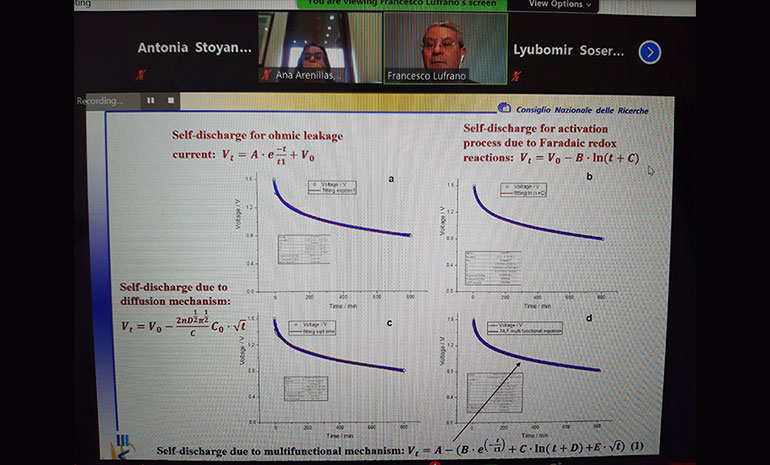In implementation of the work program under the BIScaps project on 10.11.2020 on-line training was conducted in several separate modules.
Prof. Dr. Antonia Stoyanova, project coordinator, briefly presented its main objectives and introduced foreign partners to the Bulgarian research team. The main research activities carried out in the partner organizations (CSIC-INCAR, Spain and CNR-ITAE, Italy) were also presented.
The trainings were conducted by representatives of CSIC-INCAR and CNR-ITAE, prominent specialists in the relevant scientific field and covered the following more important aspects:
- Introduction of supercapacitors and basic electrochemistry;
- Synthesis and characteristics of carbon materials and manganise oxides and their use in supercapacitors.
Programme
1st Training Course – BISCaps
starting time 11:00 of 10 November 2020 (10:00 СЕТ)
- Introduction of the Project BISCaps (10-15 Min - Prof. Antonia Stoyanova)
- The research at the Institute CSIC-INCAR of the Consejo Superior de Investigaciones Científicas (CSIC) – SPAIN (10-15 Min. – Ana Arenillas)
- The research at the Institute CNR-ITAE of the Consiglio Nazionale delle Ricerche (CNR) – ITALY (10-15 Min. – Francesco Lufrano)
First module: 10 November 2020, time: 11:30 (10:30 СЕТ)
SYNTHESIS AND CHARACTERISTICS OF MATERIALS FOR SUPERCAPACITORS
(Dr. Pietro Staiti - staiti@itae.cnr.it ) - 1 h
- Synthesis of manganese oxide via co-precipitation method
- Preparation of composite electrodes based on activated carbon and MnO2 materials
- Characterization of materials and electrodes
- Introduction of supercapacitors and basic electrochemistry
- Study of active electrode materials in half-cell test (three-electrode system)
- Cyclic voltammetry
- Galvanostatic charge-discharge measurements
Second module: 10 November 2020, time: 12:30 (11:30 СЕТ)
CARBON MATERIALS FOR SUPERCAPACITORS
(Prof. Ana Arenillas) - 1 h
- Requirements of carbon materials for their use in supercapacitors
- Carbon gels synthesis step by step
- Advantages of the MCAT technology for carbon gels synthesis
- Previous experiences of MCAT in the supercapacitor field
Third module: 10 November 2020, time: 16:00 (15:00 СЕТ)
(Dr. Francesco Lufrano – lufrano@itae.cnr.it) – 1h
- Introduction of supercapacitors – 2nd part
- Preparation of carbon electrodes based on carbon xerogels and activated carbon
- Characteristics and types of electrolytes
- Investigation of supercapacitors in full-cell test (two-electrode system)
- Cyclic voltammetry at different voltage scan rate e.g. 5 to 100 mV/s
- Galvanostatic charge-discharge measurements at different current density e.g. 0.2 to 2 A g-1
- Cycling stability
- Electrochemical impedance spectroscopy


